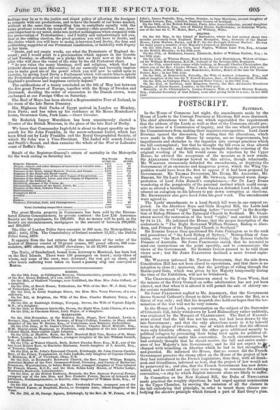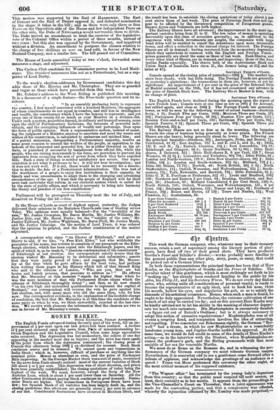POSTSCRIPT.
SATURDAY.
In the House of Commons last night, the amendments made by the House of Lords to the Corrupt Practices at Elections Bill were discussed. The chief alterations were the one which superadded the requirement that the address of the Lords as well as that of the Commons should pre- cede the issue of a Commission of inquiry, and the one which prevented the Commissioners from making their inquiries retrospective. Lord Jomc RUSSELL opened the discussion, by stating that the alterations, which were made in the other House by surprise, are no improvements, but impediments and obstacles to the inquiries into corrupt practices which the bill contemplated ; but that he thought the bill even as thus altered would be a benefit; and therefore, as he thought that the restoring of the original wording of the bill would cause its rejection by the Upper House, he advised the acceptance of the measure as it now stands. Sir ALEXANDER Coexauna bowed to this advice, though reluctantly. Mr. WALPOLE strenuously defended the amendments, as depriving the Government of an enormous and dangerous power, which the Whig Op- position would have been the first to oppose if it had been proposed by Government. Mr. THOMAS DUNCOMBE, Mr. HUMS, Mr. Aomorsay, Mr. Baum; Sir DE LACY Evans, and Mr. OSWALD, expressed warm disap- probation of Lord John Russell's complaisance,—Sir De Lacy Evans wondering at the perspicuity of the paternal instinct which could recog- nize so altered a bantling. Sir Jamas GRAHAM defended Lord John, and uttered an eulogium on his labours to put down corruption at elections. Mr. BROTHERTON also gave Lord John his good word. The afnendments were agreed to.
The Lords' amendments to a local Scotch bill were in one respect re-
jected. In the Aberdeen Boys and Girls Hospital Bill, the Lords had struck out the word "right" standing before "reverend" in the descrip- tion of Bishop Skinner of the Episcopal Church in Scotland. Mr. GLAD- STONE moved the restoration of the word " right," and carried his point by 64 to 15. He informed the House, that the proper description of the ecclesiastic is " The Right Reverend 'William Skinner, Bishop in Aber- deen, and Primus of the Episcopal Church in Scotland."
Sir ROBERT Limas then questioned Sir John Pakington as to the rank
and precedence of " the Lord Bishop of Sydney," Metropolitan of Aus- tralia, over " the Most Reverend Archbishop Croly," the Roman Catholic Primate of Australia. Sir JOHN PANINGTON stated, that he intended to send out instructions on the point speedily, and to communicate the views of the Government. Sir ROBERT INGLIS pressed to be told those views now ; but Sir JOHN PAKINGTON declined a more formal expla- nation.
Mr. WALPOLE informed Mr. THOMAS Duncosunr, that the ride down Constitution Hill has not been closed to equestrians, and that there is no intention to close it ; moreover, that the privilege of riding through the Stable-yard Gate, which was given by her Majesty temporarily during the time of the 'Exhibition, will not be withdrawn.
The Caaricamoft of the EXCHEQUER stated to Sir PAGE WOOD' that the minute of the Privy Council on coffee adulteration has not yet been altered, and that when it is altered it will permit the sale of chicory un- der certain regulations. Sir Torur Pexisroron replied to Mr. Anna:emir, that the Government deems General Cathcart's threat to drive the Caffies across the Kei, as a threat of war only ; and that his despatch does hold out hopes that the ter- mination of the war will not be very remote.
In the House of Lords, a conversation on the subject of the Surrender of Criminals Bill, lately withdrawn by Lord Malmesbury rather suddenly, was originated by the Marquis of CLANRICARDE. The Earl of Mamm- al:TRY stated that the bill was not his own, but had been drawn by the late Government ; and that the only alterations made in it by himself were in the shape of two clauses, one of which defined that the offences were only felonious offences, and the other gave additional security to political refugees by preventing their being tried again for political of- fences if surrendered under this convention. In such circumstances, he had certainly thought that he should receive the full and entire assist- ance of her Majesty's late Government; and he did not expect to jip charged with trenching on liberties which he had in fact strenutheulla and guarded. He informed the House, that no sooner did the FrenCh Government perceive the strong effect on the House of the project of law they had introduced to the French Legislature, than they, with all frank- ness and friendliness, informed us here, that the project of law would not be persevered in ; and also, that the French Government has now deter- mined, and he could not say they were wrong, to renounce the existing convention,—a step by which English interests alone are likely to suffer.
In Committee on the New Zealand Bill, the Duke of NEWCASTLE made practical the weighty objections he had urged against nomineeism in the Upper Chamber, by moving the omission of all the clauses in the bill embodying that principle, in order to insert those clauses em- bodying the elective principle which formed a part of Earl Grey's plan.
This motion was supported by the Earl of Ilanaoway. The Earl of DESsar and the Earl of DERBY opposed it, and defended nomination in the shape it takes in the bill ; and as there were only three or four Peers on the Opposition side of the House and few independent Peers on the other side, the Duke of Newessue would not trouble them to divide. The Duke moved an amendment to limit the exercise of the legislative veto of the Colonial Office within a period of three months, instead of two years : but this also was opposed by the Government, and negatived without a division. An amendment to postpone the clauses relative to the charge of five shillings an acre on land sold, in favour of the New Zealand Company, met a similar fate. The bill passed out of Committee.
The House of Lords assembled today at two o'clock, forwarded some measures a stage, and adjourned.



























 Previous page
Previous page